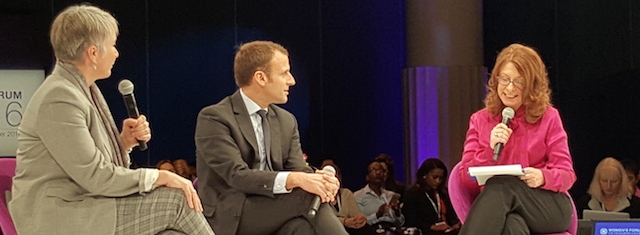Vips
YES I AM A FEMINIST SAID EMMANUEL MACRON AT WOMENS FORUM FOR ECONOMY & SOCIETY
DEAUVILLE LAST DECEMBER

Emmanuel Macron at Women's Forum Deauville (Source: Rahma Sophia Rachdi)
USPA NEWS -
Emmanuel Macron loves women and they make him good. In December, former minster of economy was invited to the Women's Forum in Deauville, alongside the Chairwoman, Clara Gaymard before the audience of 1500 most powerful and influential women. He succeeded in seducing the demanding audience...
Emmanuel Macron loves women and they make him good. In December, the ex-minster of economy was invited to the Women's Forum in Deauville, alongside the Chairwoman, Clara Gaymard before the audience of 1500 most powerful and influential women. The candidate succeeded in seducing the demanding audience of women leaders from around the world, comparing him to the first Canadian Minster Trudeau a la Francaise ...
Here is the full content of the exchange between Emmanuel Macron and Claire Doole, which lasted 30 minutes on December 2, closing the Women's Forum, for Economy & Society in Deauville. The suspense of the arrival of Emmanuel Macron had glided during the two days of forum, before arriving at the podium, obviously very expected like a guest star, by these dealers women and the press.
Since 2006, Claire Doole has made promotional and broadcast videos for numerous clients, including the International Committee and Federation of the Red Cross, the European Commission and various UN agencies covering the fields of human rights, refugees, health, environment, trade and development. Many of Claire Doole´s reports have been aired on CNN and Al Jazeera English, as well as by other broadcasters around the world courtesy of the European Broadcasting Union and UNIfeed.
Claire Doole : Mr Macron, you must probably be aware, on the 7th of November, the women of France were asked to down tools, go off the job... and it was actually at 4.34pm and 7 seconds. Now, why was that? That was because that was the theoretical moment when women start working for free... can you imagine? I would never work for free. Until the end of the year, before the average pay gap between men and women... that's due to it. Now, Mr Macron, what are you gonna do to try and reduce those salary differentials? Because I understand that, at the rate of progress that France is making so far, it would be at the end of the 21st century, 2186, when women are earning the same as men.
Emmanuel Macron : Thanks very much for inviting me. Because, I mean, it provides such an experience. I think that something similar with women in France being part of an executive board or something like that... One or two males in such an assembly...
CD : It´s good, isn´t it? It´s positive discrimination.
EM: So, it means something. So thanks for this experience!
CD : Exactly. So, if you were to become president, Sir, what would you do about this disgraceful gender pay gap?
EM : I think this situation you described is directly linked with what I just mentioned. The fact that women are not properly represented on executive boards, in our national assembly, and are not fully part of those who make decisions and who have made decisions on a lot of these issues. That's a first explanation. When you look at this salary gap between men and women in France, and when you try to find proper explanations... It´s something comparable with what you described for your country. First, it's the part-time jobs. Because when you look at job participation for men and women, I mean, when you look at the situation, 66%, something like that, of women do participate to our labour market. But 80% of women in France, have part-times they didn't choose. They want to work for a full-time job. Which de facto creates, automatically, a gap, in terms of salary. Secondly, access to responsibility and opportunity. That's one of the key explanations of this gap. Thirdly, career. And the best answers are a series of answers. First, stop with discrimination. Today, you still have a lot of discrimination when you hire people, and we accepted that. You have laws... and we passed a series of laws, because in France, we are obsessed by laws and the ability to create new legislation, I have to say. But we don't implement them.
CD : So what can you do to apply the law on discrimination?
EM : First, you have to strengthen when you have discrimination, through testing especially, a series of processes. And what is true for females, is true for minorities as well, because we have exactly the same issue, we have exactly the same laws. We are supposed to forbid this kind of practices but we don't control properly this kind of behaviour. So, testing and a strong answer. Secondly, in a lot of cities in this country, we don't have the proper answer for women when they have children. First because, you have this social representation and it is not properly shared between men and women. And the burden of children, I have to say, is not fairly shared between men and women, de facto. And second, when you don't have precisely all the infrastructures allowing you to go to work, you are forced basically to stop your career during years and years. That's an inequality and that's an investment to be made. Not just for women and ending inequalities, but for children as well.
CD : If you just take that point, what practically then can you do, to ensure that having children, working part-time, is not seen as hampering women's progression? What would you like to see more: paternity leave, following the Swedish model where the men also have three months, just as well as women?
EM : We passed in France, two years ago, such a law, sharing the paternity leaves and precisely sharing the responsibilities. That's a cultural issue. In France, it's changing. We are definitely different from Germany, for instance, and a lot of other European countries regarding this issue. But we have to move forward. And I think what you need is first to have the legal framework. Now that's the case, we passed a very useful legislation. Second, you need role models, and I think that's very important regarding this issue. You need role models, first to promote some men sharing this responsibility, taking their leaves when they have children and having great careers. And you need leaders in the corporate and the political fields, having such a career, and taking their responsibility. On the other side, you need to promote, and that's the case in this room, and I recognize a lot of very well-known faces, but you need women role models. And that's a critical issue. When you don't have a role model, you don't precisely break a sort of cultural "bloquage" and you don't manage to progress in your society. And that's where allowing females to access responsibilities in the business field, in the political field, is absolutely critical. Because today you have 17% of executive top jobs for women, you have 30 to 40% top executive job in the CAC 40 in France to women and you have something between 15 and 20% of our representatives at the national assembly as women.
CD : And what would you like to see if you became president? What percentages and what figures in these top jobs and perhaps in a potential cabinet?
EM : But, you know, 50% because when you look at the situation, I have to confess something, women are not a minority, it's 50%. And there is a big confusion in our country, a lot of people, a lot of policy-makers consider that gender policy is a minority policy. I'm sorry, that's no longer the case, and if they are, even realistic for themselves, they should consider the fact that they could become a minority in a few decades. So definitely...
CD :50-50 cabinet?
EM : 50-50 cabinet and 50-50 at the national assembly. But it's not just by law that you can change such a situation. It's through your own practices. That's absolutely critical. I founded, 8 months ago, a new political movement, "En Marche", that you mentioned. At the very beginning, I had a lot of men, because they are overrepresented in the political field. And after a few months, I had this issue: "Okay, guys, I have a lot of young, white men, which is not, first, exactly the face of our country, and second, I'm not sure that's the best way to embody this renewal." So we opened the door progressively. But that's an effort. I mean, a lot of women consider that political commitment and playing their part, taking a role, a commitment in a movement, is not for them.
CD :Not in this room, Sir, not in this room.
EM: I agree with you. But that's the case in society. We tried to go to these women and say: "Okay, you should commit, you should be part of the club." And they said: "I'm sorry, I have a job, I have my family, I hate politics, I mean I don't want to be part of this game." Why? Because this game was made by men for men, with a lack of civility in a certain way, with specific rules, absolutely impossible for women, and especially women with a successful career. But you know what? It's exactly the same now for men. People, I mean, men in my generation, don't go into politics for the exact same reason. So, my deep conviction is that the more you manage to convince women to commit themselves, to go into politics, the more you will change roles, and the more you will attract talents, but, I mean, coming from both sides. So, we appointed a series of representatives in each local constituency. We implemented the 50-50 rule. Now, here in this department, our representative is a woman. But I have 50% of women in my representatives. In the other political parties, it's between 10 and 20%. After that, when they go to the elections for the national assembly, they propose, when they don't want to pay and to be punished, they propose 50% of women, but in hopeless constituencies. And when you look at the situation at the end of the day, you just have 15% of women representatives.
CD : So, they'll be in constituencies where they actually have a chance of winning, will they? This is your aim?
EM : Exactly. But the day you have 50% of your top executives in the movement as women, you'll have exactly the same chances, the same opportunities. And that's why, formally, in France, you have a sort of equality. We passed a lot of laws, we have a good job participation for women, women are extremely well represented at university, more than men, but you have today, this discrimination, and you have a big loss of opportunity for women in our society... but for our society as a whole, which is absolutely critical.
CD: I'm sure everybody in this room would agree that, and I just thought that in the spirit of networking, I met a wonderful woman last night, who is French-Canadian, her name is Rebecca Amsellem, and she´s the “fondatrice“ (the founder) of “Les Glorieuses“. She´s an economist, and I´m sure that she could a very useful adviser for the salary differential. She´s very bright, very young, and has some very concrete ideas. [...] Mr Macron, are quotas the silver bullet? Or would you like to see more quotas, if you were to be president? Is it something that you think could be legislated and actually enforced?
EM: I don't believe it's the silver bullet, but I think it allows behaviours to change. And you mentioned this law, passed a few years ago, called Coppé-Zimmerman for the presence of women on executive boards. It allows in our country to go from 10% to 36%. So, I mean, it provides some effects. I think now, our key issue is not to have women on boards, but, I mean, as top executive members. It's something difficult, because you have to reorganize the company, you have to promote women progressively, at different levels. But I do think that we will probably need some quotas for top executive members, and I do agree with this idea. But I do agree with what you mentioned, the fact that it is not a silver bullet. For me, the best way to succeed in this way, is to say “you need innovation and inclusivity“. For me the two legs of modernity today are innovation and inclusivity. When you are in a country, or in a company, where you don´t innovate, it can go very well on a day-to-day basis, but you are already dead... because of the fact that a competitor will suddenly arrive, innovate, disrupt your market and will kill your business. When you don't have inclusivity, in terms of gender policy, minority policy, in your neighbourhood, you are dead as well, on the mid to long-run. Because you cannot succeed by excluding part of your society, by not providing, precisely, a due role to everybody. So, I do believe today, that our companies, and our policy-makers, will integrate into their model, I have to say, into their own decisions, these two legs.
CD : You said some quotas. Can I push you on that? What are you looking for in specifics?
EM : I think having quotas with a sort of mid-term objective, exactly like for Coppé- Zimmerman, is a very good solution. We did it. I mean, it's not the unique solution, because we failed in terms of representing women in the political field. But I think if you provide 5 to 10 years to move forward and to have X% of top executives being women, I do believe it will be a trigger for a reorganization, a reprocessing, and the best way to promote women at different levels. So my point is to say, I think we need quotas for women in top executive jobs. Second, it's not sufficient, you need role model, and you need to promote innovation and inclusivity, and third, you need to increase, your aggressiveness I would say, in terms of discrimination. Because a lot of young women are discriminated in our country, exactly like a lot of minorities. If you don't answer very aggressively and very rapidly that's a nightmare for them, and that's the best way to nurture frustration and division in society. Promoting women in top executive jobs will change on the mid to long-run this situation, because their sensibility to this issue will be different for sure. But you need a short-term approach as well. See the rest of the interview in the next article, called Part II
Emmanuel Macron Former Minister Fo Economy Candidate For President 2017 Womens Forum Clara Gaymard Jacqueline Franjou Claire Doole Women Feminism Gender Equity Mureaux Discrimination Rahma Sophia Rachdi
Liability for this article lies with the author, who also holds the copyright. Editorial content from USPA may be quoted on other websites as long as the quote comprises no more than 5% of the entire text, is marked as such and the source is named (via hyperlink).








